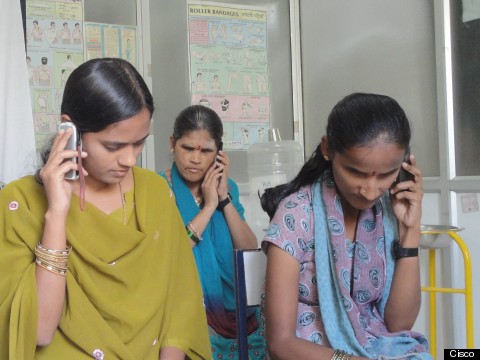
Women are 21% less likely than men to own a mobile phone. Beth Gertz, head of the mWomen program at GSMA, the global association of mobile operators, shared this sobering statistic at a session on mWomen chaired by Cherie Blair at the World Mobile Congress in Barcelona this week. That 21% represents a tremendous opportunity for impact. According to USAID, 41% of mobile subscribers in the developing world use their phones to "increase their income and professional opportunities." How do we close this gap so women can access the same professional and economic opportunities as men?

There are two key barriers, said Gertz. One is perceptions of value: some women don't see why they need a phone. The second is technological illiteracy: they're not sure how to use it.
Smart social enterprises are trying to solve for both. These three organizations were shortlisted for the prestigious GSMA Global Mobile Awards this week, including my own. They are giving women compelling reasons to get connected - namely access to information that improves their lives - and are showing them, through trusted peers, how easy it is:
- Text to Change (TTC) - TTC delivers interactive SMS quizzes in countries like Uganda and Tanzania on malaria and HIV treatment, maternal and child health, and family planning - all issues that matter to women. The quizzes are social in nature and friends compete to be the first to respond or to get the highest score.
- Mobile Alliance for Maternal Action (MAMA) - A partnership with USAID and Johnson & Johnson, MAMA syndicates health content via mobile in 50 countries, while going deep in three countries - Bangladesh, India, and South Africa. Topics include reproductive health, maternal and newborn health, nutrition, and vaccines. Women value the content so much they are paying for it.
- Labor Link - For the millions of young women that make our clothes and our electronic gadgets in countries like India and China, Labor Link plugs them in to a channel of empowering content. Many of these women earn less than the price of a latte every day, so informational messages and surveys cover basics like financial literacy, rights in the workplace, and health and nutrition.
Cherie Blair, whose foundation invests in mobile technology for women, shared her vision at the Mobile World Congress that "all women benefit from mobile so they can move up the ladder of prosperity." Of the 65,000+ attendees that descended on Barcelona from 205 countries for the conference this week, 99% were focused on buzz words like 4G, LTE, and NFC (near-field communication). But for the 1% of us leveraging the transformative power of mobile to catalyze this vision of prosperity, our buzz words are ones that everyone can understand: voice, access, and opportunity.
Learn more about Cisco's Corporate Social Responsibility: csr.cisco.com
Connect with Cisco CSR on:
Twitter: www.twitter.com/@CiscoCSR
Facebook: http://www.facebook.com/CiscoCSR
Google+: gplus.to/CiscoCSR
Pinterest: http://cs.co/CiscoCSRPinterest